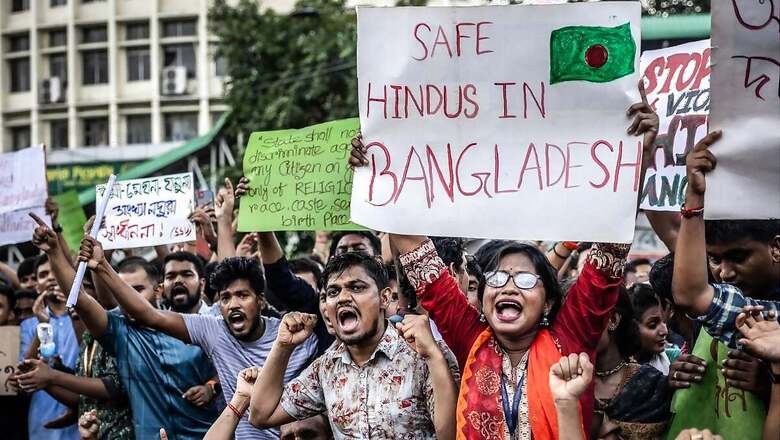
views
Tureen Afroz already had a premonition that Sheikh Hasina’s exit from the country would not bode well for her. After all, she had served as the chief prosecutor in the 1971 war crime trials and had come on the radar of Islamists since that moment only. Her worst fears came true on the very day that Hasina left Bangladesh when a mob entered her home and tortured her brutally. Her hair was chopped off, she was admonished for not wearing hijab, even called a prostitute and a sharp pencil was repeatedly jabbed in her leg. After subjecting her to this ordeal, the mobsters finally left the place but not without a warning to her that she must leave Bangladesh.
Afroz was not alone in being the target of Islamists. Aarti (name changed), a Hindu and hence a kafir in their eyes, was raped by a mob of not less than 30 men behind a cowshed in Satkhira district at a time when her husband was admitted to a hospital for medical treatment. Afroz or Aarti, there can be no denial about the fact that Bangladesh is now a sight of daily mob violence. The world witnessed another exhibit of the same on Wednesday, when a 15-year-old boy, Utsav Mondal, was thrashed by an Islamist mob in front of the Bangladeshi military personnel, that too inside a police station. There were allegations of blasphemy against him but instead of letting the country’s anti-blasphemy law take its course, the Islamists decided to take matters into their own hands even as the police and military watched silently.
The protests in Bangladesh that began as a students’ movement against job quotas took no time in becoming a regime-change campaign against Sheikh Hasina, but since her ouster have further deteriorated into complete lawlessness of which minorities, especially Hindus, have become the worst victims. As per a report by the New Delhi-based Centre for Democracy, Pluralism and Human Rights, within a week of Hasina’s exit from Bangladesh, more than 200 cases of persecution of Hindus were recorded. This included cases of targeted killings, vandalism of personal and business properties and even sexual assault of women. There is even a systemic effort to erase the identity of Hindus from the country as many Hindus are reporting that looters and arsonists are robbing them of their government documents as well. This is a fact that can be further confirmed by the manner in which more than 50 government teachers have been assaulted and forced to resign by their own students emboldened by the Islamists. In fact, in a recent controversial move, a government ministry even asked the departments to prepare a list of Hindu officers. Later, it was clarified that it was a clerical error and the list was meant to be prepared for the purpose of Durga Puja celebrations, but the human rights groups have refused to accept this excuse.
Even as Bangladeshi Hindus are witnessing the worst form of targeted violence, a culture of denial, at the global level, has emerged around their plight. The international media has barely covered their myriad stories of persecution but even in the few pieces that have been published, the Hindus have been actively blamed for their political association with the Awami League (AL) and the attacks have been termed as “revenge attacks”.
While it is true that the AL party enjoys a large support from minorities, atheists and even liberal-secular Muslims, the persecution of Hindus has nothing to do with supporting the party. The incidents that are being reported, especially from the hinterland, are targeting the most downtrodden section of society who are too poor to have any political affiliation whatsoever. Even Indian media outlets have platformed persecution deniers from Bangladesh who are gas-lighting us to believe that everything is business as usual. But the current Indian government is not buying this line of defence.
In a phone conversation with US President Joe Biden, PM Modi duly raised the issue of targeted violence against Hindus in the country. However, while the handout of the telephonic conversation released by the Indian side did mention this, the American version of the same failed to mention the plight of Hindus. This has ended up bolstering the confidence of the interim government of Bangladesh led by Muhammad Yunus, who has quickly dismissed India’s concerns by calling incidents of persecution as political and not communal in nature. He has even accused India of viewing every political force in Bangladesh, except Hasina, as ‘Islamist’. Yunus may be trying to obfuscate the truth by indulging in victim-blaming but his government’s record, so far, hardly inspires any confidence especially when he himself has hobnobbed with Islamist political forces such as Hefazat Chief Mamunul Haque.
His government has also lifted the ban from Jamaat-e-Islami, an outfit that wants Sharia law in the country and has links with the international terror organisation Muslim Brotherhood.
What Yunus as well as the Biden administration are doing is nothing but straight denial of the plight of the Hindus in Bangladesh. Even China has revived its contacts with Jamaat by conducting a meeting at their office in the country. At a time when big powers such as the US and China are looking away and even denying the persecution of minorities in Bangladesh, only India has stood as the rare voice of support for them.
According to certain people, the denial by the US stems from the fact that the anti-Hasina forces were nurtured by the Americans over a considerable period of time, and today, when Hasina has been finally unseated, it will be too risky for them to indict the Islamists for their acts against religious minorities. So, no wonder why they have turned a blind eye to Hindus becoming collateral damage of the pro-US regime. This is a believable proposition given the way the reports of American representatives meeting Jamaat leaders have been coming in for the past few months now. But it still doesn’t absolve the larger international community of actively cultivating a culture of denial around Hindu persecution of which the United States itself is an obvious long-time culprit.
In the last few years, there have been many instances when the US government, and the Biden administration in particular, has taken steps to fix accountability for the ill-treatment of minorities by various countries. This includes the Chinese government officials who have been sanctioned over the treatment of Uighur Muslims in the Xinjiang province, or the Myanmar military officials for their persecution of Rohingya Muslims. In 2020, the US even placed Nigeria on the watch list over the persecution of Christian and Muslim minorities. In complete contrast to this, Hindus have rarely attracted any attention from the American establishment. In fact, when India tried to execute its civilisational responsibility towards Hindus left behind in the Islamic part of the subcontinent after partition, in the form of CAA in 2019, certain actors in the US criticised it.
The biggest example of silence on the plight of Hindus in the Indian subcontinent is present in Pakistan, where minor Hindu girls are abducted, forcefully converted, gang-raped and sometimes married to much older Muslim males on a daily basis. However, this has never raised any alarm in the minds of powers because you see, Hindus are a rather small price to pay for protecting their geopolitical interests in the region. What has already been normalised in Pakistan is now being normalised in the case of Bangladesh too. But it is nothing new. In 1971, during Operation Searchlight, widespread killings and rapes of Hindu women were a dark reality, and yet we all know how the perpetrators of these war crimes were left with total impunity. Not just this, even at that time, the US and China had sided with the Pakistani military. What’s happening today is nothing but a grim reminder of it.
Ironically, Hindus who are often demonised in India for practising majoritarian politics, are a minority everywhere else in the world. 95 per cent of the Hindus call India or Nepal their home with just 5 per cent of their population spread across the world, making them a vulnerable minority in every single country. This not only makes the expectations from India to speak for them very overwhelming, but it also makes it imperative for Hindus to do some soul-searching and raise their voices for their co-religionists. In the United States itself, a large Indian diaspora is present that consists of practising Hindus who can use the means at their disposal to do it. As for India, there prevails a selective amnesia with regard to the persecution of Hindus. The big Bollywood celebrities who raise their voice for every cause hardly ever come forward to speak on this. The film industry is not alone as even certain political parties as well as left-leaning intellectuals never speak for Hindus due to their tactical alliance with Islamists. For them, any recognition or discussion of violence by Islamists would also propagate Islamophobia and hence they consider it better to stay silent or even go in denial. This makes persecuted Hindus one of the most alienated and suppressed people in the world with no constituency of support. Thus, it is high time that the Hindu diaspora communities as well as those in India, whose conscience is still functioning, raise their voice against the torture of Hindu minorities in Bangladesh because the rest of the world is clearly not going to do it.
The author is a New Delhi-based commentator on geopolitics and foreign policy. She holds a PhD from the Department of International Relations, South Asian University. She tweets @TrulyMonica. The views expressed in the above piece are personal and solely those of the author. They do not necessarily reflect News18’s views.




















Comments
0 comment